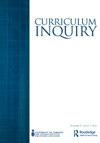詹姆斯·鲍德温的课程声音:质疑白人作为课程
IF 1.6
3区 教育学
Q2 EDUCATION & EDUCATIONAL RESEARCH
引用次数: 0
摘要
摘要:在这篇文章中,我首先考察了詹姆斯·鲍德温作为一个独特的课程声音,他的作品开启了一场对话,质疑白人作为课程。在《白人问题》、《关于成为白人…和其他谎言》、《白人的罪恶感》和《白人种族主义或世界社区》等一系列文章中,鲍德温以四种方式直接向白人提出了白人问题:解决历史否认、健忘症和神话化;白人身份的心理社会概念化;白度作为一个系统;白人是一个虚假的现实系统。鲍德温的方法是一种特殊的方法,一种以大胆的实话实说为中心的审问白人的课程方法。具体性与抽象性形成鲜明对比,抽象性是一种质疑种族主义的课程方法,将白人实践作为一门课程,强调对白人的更广泛、更不直接的讨论。在这篇文章中,我认为抽象主导了学院中许多当前的反种族主义教育方法。这种抽象的方法避免了对白人的具体命名,而是涉及到对种族和种族主义的表演。为了抵制白人课程话语,鲍德温提出了指控和忏悔作为对话必要性的重要作用。我使用鲍德温的框架来回应最近批判性白人研究学者对反种族主义教育中忏悔方法的批评。鲍德温的工作考察了白人作为课程的特殊性,并援引了指控和忏悔的教学策略,为当今的教育工作者推进种族正义和反种族主义的教学策略提供了新的机会。本文章由计算机程序翻译,如有差异,请以英文原文为准。
James Baldwin’s curricular voice: Interrogating whiteness as curriculum
Abstract I begin in this article with an examination of James Baldwin as a distinct curricular voice whose work opens a dialogue interrogating whiteness as curriculum. In a series of essays, “The White Problem,” “On Being White … And Other Lies,” “The White Man’s Guilt,” and “White Racism or World Community,” Baldwin directly addressed white people on the question of whiteness in four ways: addressing historic denial, amnesia, and mythologizing; the psychosocial conceptualization of white identity; whiteness as a system; and whiteness as a false system of reality. Baldwin’s approach was one of specificity, a curricular approach to interrogating whiteness centered in bold truth-telling. Specificity stands in contrast to abstraction, a curricular approach to interrogating racism that decenters practices of whiteness as a curriculum, emphasizing broader, less direct discussions of whiteness. In this article, I contend that abstraction dominates many current approaches to antiracist pedagogy in the academy. This abstract approach avoids naming whiteness specifically and instead involves performative engagements with race and racism. To counteract white curricular discourses, Baldwin proposed the important role of accusation and confession as a dialogic necessity. I use Baldwin’s framing in response to recent critiques from critical whiteness studies scholars on confessional approaches in antiracist education. In examining the specificity of whiteness as curriculum and invoking pedagogical strategies of accusation and confession, Baldwin’s work offers new opportunities for advancing racial justice and antiracist pedagogical strategies for today’s educators.
求助全文
通过发布文献求助,成功后即可免费获取论文全文。
去求助
来源期刊

Curriculum Inquiry
EDUCATION & EDUCATIONAL RESEARCH-
CiteScore
3.10
自引率
17.60%
发文量
37
期刊介绍:
Curriculum Inquiry is dedicated to the study of educational research, development, evaluation, and theory. This leading international journal brings together influential academics and researchers from a variety of disciplines around the world to provide expert commentary and lively debate. Articles explore important ideas, issues, trends, and problems in education, and each issue also includes provocative and critically analytical editorials covering topics such as curriculum development, educational policy, and teacher education.
 求助内容:
求助内容: 应助结果提醒方式:
应助结果提醒方式:


